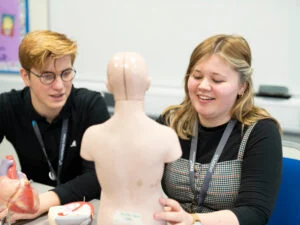Still unsure what a T Level is, or whether it’s the right option for you? Take a read of our blog, as we explain all the key information you’ll need to make an informed decision about this course type.
What are T Levels?
T Levels are a two-year qualification for 16 to 19-year-olds that follows GCSEs.
Equivalent to A Levels, they have been created in collaboration with over 250 businesses and are designed to give young people a head start towards the future they want.
What does a T Level include?
80% College: The majority of the T Level is based at College where students are taught by experienced subject experts in an interactive and hands-on learning environment. At College, they’ll gain in-depth knowledge into their chosen specialism and will develop industry-relevant skills.
20% Work Placement: The T Level includes a nine-week work placement with a local employer. The placement gives students the opportunity to gain valuable industry experience, whilst further developing their skills and knowledge employers need.

T Level Health student, Christina, completed work experience at a care home in Whitstable. She said: “I chose to study the T Level because it offered a hands-on experience. During my placement I cared for a wide range of people with different needs. It was a fantastic experience, and I really enjoyed it.”
What T Level subjects are available?
T Levels are available across 20 different T Level routes nationally, and many of these are offered across East Kent Colleges Group’s family of Colleges.
Here, at EKC Canterbury College, we currently offer T Levels in Accounting, Business Management and Administration, Digital Production, Design and Development, Electrotechnical Engineering, Design, Surveying and Planning for Construction, Design and Development for Engineering, Maintenance, Installation and Repair for Engineering, Health, Education and Early Years, and Marketing.
What are the entry requirements?
The entry requirements are a minimum of six GCSEs at grades 9 to 5 or equivalent, ideally including English and mathematics.
How are T Levels graded?
Students who successfully complete a T Level will be awarded an overall grade of Pass, Merit, Distinction, or Distinction*, and receive a nationally recognised certificate.
To achieve one of the above grades, students must complete their technical qualification (comprised of a ‘core’ component and one or more ‘occupational specialism’ components) and work placement and meet the minimum requirements for English and mathematics (if they have not done so already).
Is a T Level Worth the Same Number of UCAS Tariff Points as an A Level?
One T Level is equivalent to three A Levels and is worth the same number of UCAS Tariff points overall.
For example, if a student achieves a Distinction* in their T Level, it is equivalent to achieving three A*s at A Level. The T Level and the three A Levels are both worth 168 UCAS Tariff points.
The table below shows how much each T Level grade is worth in UCAS Tariff points, and the equivalent A Level grades:
| UCAS Tariff points | T Level Overall Grade | A Level Grades |
| 168 | Distinction* (A* on the ‘core’ and distinction in the ‘occupational specialism’) | A*A*A* |
| 144 | Distinction | AAA |
| 120 | Merit | BBB |
| 96 | Pass (C or above on the ‘core’) | CCC |
| 72 | Pass (D or E on the ‘core’) | DDD |
What can you do after a T Level?
After completing a T Level, students can enter:
- Employment
- University
- A Higher Apprenticeship
- A Traineeship
- Other further study
Design, Surveying and Planning alumnus, Jenson secured a full-time role with the Jenner Group, a construction company whom he impressed during his T Level work placement.

When we spoke to him, he told us: “My T Level course was all about project management, I excelled at it and really enjoyed it. The course led me to do work experience with Jenner Group. After I completed my work placement they offered me a Site Trainee position. Jenner have been fantastic, and College has really helped me along the way.”
Want to Know More?
To learn more about T Levels, visit our T Levels page.


